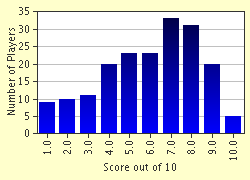Quiz Answer Key and Fun Facts
1. In all of these phrases there is a word related to Latin "gustus" except in one. Which one?
2. Which of these words is etymologically unrelated to the other three?
3. One of these is a complete outsider. Which one?
4. All of these words have the letter sequence -luc-, yet one is completely unrelated. Which one?
5. All of these except one are "akin" somehow. Which of them does not belong to the same word-family?
6. One of these is not related to Greek or Latin and therefore not to any of the three others. Which one?
7. Lookalikes need not be mutually related. Which of these is not a member of the family?
8. Words that sound alike are not always mutually related either. Can you see which one is "the false relation"?
9. Three of these derive from the same Latin root. Which is the other one?
10. One of these is not from Latin at all. Which one?
Source: Author
flem-ish
This quiz was reviewed by FunTrivia editor
nerthus before going online.
Any errors found in FunTrivia content are routinely corrected through our feedback system.

